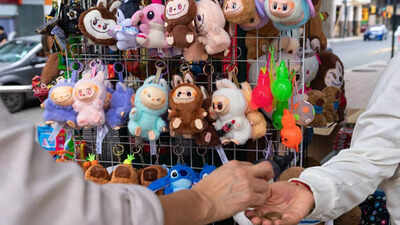ARTICLE AD BOX

The growing frenzy around Labubu dolls, small, mischievous plush monsters designed by Hong Kong-born artist Kasing Lung and sold by Pop Mart, has taken a darker turn. This week, a group of masked thieves stole roughly $7,000 worth of the collectibles from a store in La Puente, California, about 18 miles east of Los Angeles.According to the Los Angeles County Sheriff’s Department, the burglary occurred early Wednesday morning. Surveillance footage shows several individuals in hoodies and face coverings breaking in, rifling through shelves, and carrying out boxes of merchandise. Authorities say the suspects used a stolen Toyota Tacoma, which was later recovered, and the investigation is ongoing.The targeted store, One Stop Shop, posted on Instagram that thieves cleared out its entire Labubu inventory and left the premises in disarray.
“We are still in shock,” the owners wrote, urging the public to help identify the culprits.

Source: Getty Images
A toy that became an investment asset
Labubu dolls, introduced about a decade ago, were initially adored for their quirky charm and playful designs. Retailing for around $20, they are sold in “blind boxes,” meaning buyers don’t know which version they’ll get until after purchase. While the concept fuels excitement for some collectors, critics say the practice borders on gambling, preying on impulsive buying behaviors.
What started as a harmless collectible craze has evolved into a high-stakes market. Limited supply, strategic product drops, and global hype have driven prices for rare editions into the thousands. One Labubu recently fetched over $10,000 in the secondary market. This growing value has attracted not only passionate fans but also opportunistic resellers and investors.
Bots, scarcity, and skyrocketing prices

Source: Getty Images
As demand surged, savvy resellers began deploying automated bots to scoop up large quantities of Labubu dolls online within seconds, leaving everyday consumers with limited options. Many are forced to buy from secondary sellers at heavily inflated prices. Social media influencers and celebrities have further fueled demand, turning the dolls into status symbols and speculative assets.The result is a volatile collector’s market, and, as the La Puente theft suggests, one that is increasingly attracting criminal attention. With more people treating Labubus like rare art or luxury goods, the pressure on supply and security is mounting.For now, the La Puente case remains open, but it’s a stark reminder that the Labubu craze has moved far beyond toy shop shelves and into a space where money, scarcity, and crime intersect.



.png)
.png)
.png)
















 2 days ago
5
2 days ago
5









 English (US) ·
English (US) ·